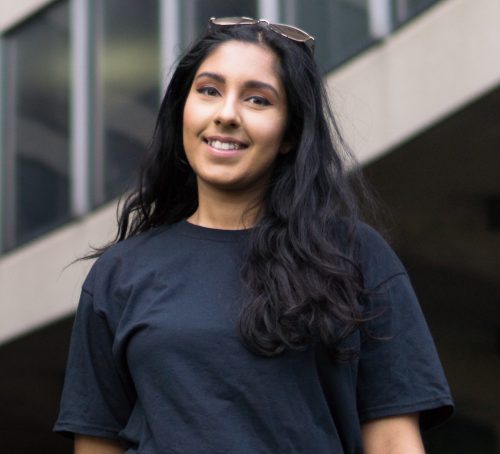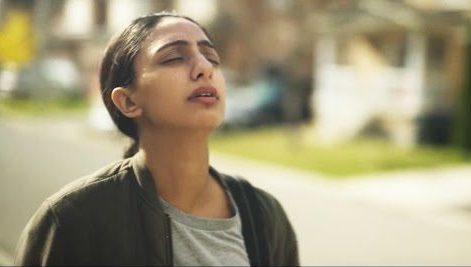by Jessie Brar – Follow @jessieebrar
It’s been over a year since director Rakhi Mutta brought up the conversation about mental health through her short film, Haneri. Haneri shows the struggle of Ruby, a young Punjabi-Canadian girl, who is struggling with depression. Her family struggles with her behavior due to their limited understanding of mental illness.
Last year, when I first saw this film, it brought literal tears to my eyes. I had never related to a character like this before. Ruby’s story felt like my story, as it did for many South Asians. It explored a taboo topic that is often brushed under the rug: mental illness. I showed the film to my friends and family and it moved them all. Haneri explored the consequences that lack of mental health education and its stigma can have.
Depression affects more than 300 million people worldwide according to the World Health Organization, but to this day, many people struggle in silence due to the stigma associated with mental illness and the fear of judgment and ridicule. Mental illness affects nearly 1 in 5 people in North America, yet some people still don’t believe that it’s an issue and think it is something that can be fixed with a prayer and a little bit of exercise.
Through The Mental Health Spotlight, I had the pleasure of chatting with the film’s director, Rakhi Mutta, and the film’s lead, Kiran Rai.
[Read Related: The Stigma of Secrets: How my Hidden Miscarriage Affected my Mental Health]
What inspired the creation of Haneri?
Rakhi Mutta: As Punjabis, we pride ourselves in having strong family values rooted in an incredibly rich culture. We are revolutionaries, freedom fighters, and artists, who have influenced mainstream culture in India and abroad for an extremely long time. Our food is loved by many, our music is remixed, and our dance is appreciated by all.
One of the things we don’t do well as a community is speak about issues that we associate with shame. We refuse to accept addiction, sexual violence, and violence against women as issues that affect our community. Instead of seeking answers, we silence our most vulnerable members of society in shame and then refuse to acknowledge their pain exists.
Mental health is one of these key issues. I have seen numerous relatives and family friends suffer silently, while their family members accuse them of being lazy, dramatic, or even attention-seeking.
This is why I wrote and directed Haneri. I wanted to make a film that highlighted the struggles of one person and how their family members react to them as a result. It is my hope that Haneri will be used as a tool for our community to begin the discussion around mental health.
You are an established actor, model, and YouTuber. You’re in the public eye a lot. How has this affected your mental health?
Kiran Rai: I think it’s affected in multiple different ways. There has been a lot of studies already showing that social media has had a huge impact on mental health – especially young adults and adolescents. It affects the way they interact with other people and how they view their own lives.
I use social media as a platform to share my work, which can have some challenges. Before, when you were advertising through traditional media such as a commercial, the information such as the views or how many ratings it received was private and had to be sought out; whereas now, everything you do is accessible. Anyone can see how many likes your post has or how many people viewed your video.
We start to compare ourselves to other influencers or artists doing similar things. I never wanted to be just a YouTuber or vlogger – my main goal and focus is acting. Looking at this in the third person put things in perspective and took away the need to constantly release content but instead release work that is meaningful. Social media will always be a tool for my work to be shared. I want to use it as an opportunity to document my path and move past the likes and comparisons.
[Read Related: #BGSpeaksUp: Twitter Chat Sparks an Important Conversation on South Asian Mental Health]
Social media can be so tricky for mental health. On one hand, it connects you with amazing things, but when comparisons and numbers get in the way, it can be harmful. One of your biggest and most impactful projects last year, in my opinion, was Haneri. What made you want to do that film?
Kiran Rai: As an actress and as a filmmaker, it was important to me to create and be a part of content that is socially conscious. I wanted something that reflects on what the community is going through; taboo issues that people don’t touch on. That’s the nature of my work. Haneri hit so close to home. Rakhi and I wrote my parts together because it was literal experiences I had. It wasn’t difficult. It was very authentic; the process was really raw. When we were shooting it, I really had to go into that space, but it was scary because I was becoming really vulnerable and showing a side I don’t necessarily show everyone else. Even though it was a character, and this what I think makes acting so great, I could delve into different parts of myself to bring that out. It became its own healing for me.
How was the response to the film?
Kiran Rai: It’s amazing, still to this day! I keep getting messages and it’s crazy because it showed how much the community was starving for this. They needed some sort of outlet. They needed to see themselves and their stories being presented on screen. I think it was so important to see something like this to know that they’re not alone if they are having mental health issues. It’s countless messages where people also opened up, sharing their own emotional journeys and mental health issues. It is heavy, but it also shows that there are clearly not enough spaces for these people to open up and talk. They feel comfortable sharing it with me, a complete stranger, and it’s possible they’ve never even shared that with anyone else. And they shared it because they saw me play that character, which was almost like a version of themselves. It really started a much-needed conversation in the community.
[Read Related: MannMukti’s New Podcast “Stories of Stigma: South Asian Mental Health”: In Honest Conversation with Salma Vir-Banks]
What advice do you have for those around you?
Kiran Rai: I always say this, but our existence is so temporary and it’s so important to recognize that. We are everything and we are nothing at the same time. We’re a part of something so much greater – this universal energy. If people started viewing things and seeing things this way, it would be so much easier to take a burden off your shoulder. Be nicer to yourself. We start building these blocks for ourselves when we really could be helping ourselves.
It really does come down to how do you treat yourself. Why do you treat yourself that way? What happened in your life to feel like this is the right way to speak to yourself? We need to start taking responsibility for ourselves, but also forgiving ourselves in the process. We need more open dialogue in our homes, our schools, and our communities. We need people to feel safer.
I think films like Haneri are helping open up that conversation.
Haneri helped start a much-needed dialogue on mental health in the South Asian community. If you haven’t seen it yet, be sure to watch it here. Also, check out MannMukti—ending the mental health stigma, one story at a time.
 Chocolate Lover – Bollywood Dancer – Bhangra Enthusiast – Mental Health Advocate. Jessie Brar studied psychology at Queen’s University and now works in youth mental health promotion with Jack.org in Toronto, Canada. Her spare time is dedicated to raising awareness about mental health through The Mental Health Spotlight (@TheMHSpotlight), a project dedicated to erasing stigma around mental health and mental illness in South Asian communities through the power of storytelling. In her downtime, she can be found cuddled up watching/reading Harry Potter, eating Reese’s Cups, or dancing to Bollywood and Bhangra tunes in front of a mirror. Check out more of her work here.
Chocolate Lover – Bollywood Dancer – Bhangra Enthusiast – Mental Health Advocate. Jessie Brar studied psychology at Queen’s University and now works in youth mental health promotion with Jack.org in Toronto, Canada. Her spare time is dedicated to raising awareness about mental health through The Mental Health Spotlight (@TheMHSpotlight), a project dedicated to erasing stigma around mental health and mental illness in South Asian communities through the power of storytelling. In her downtime, she can be found cuddled up watching/reading Harry Potter, eating Reese’s Cups, or dancing to Bollywood and Bhangra tunes in front of a mirror. Check out more of her work here.





